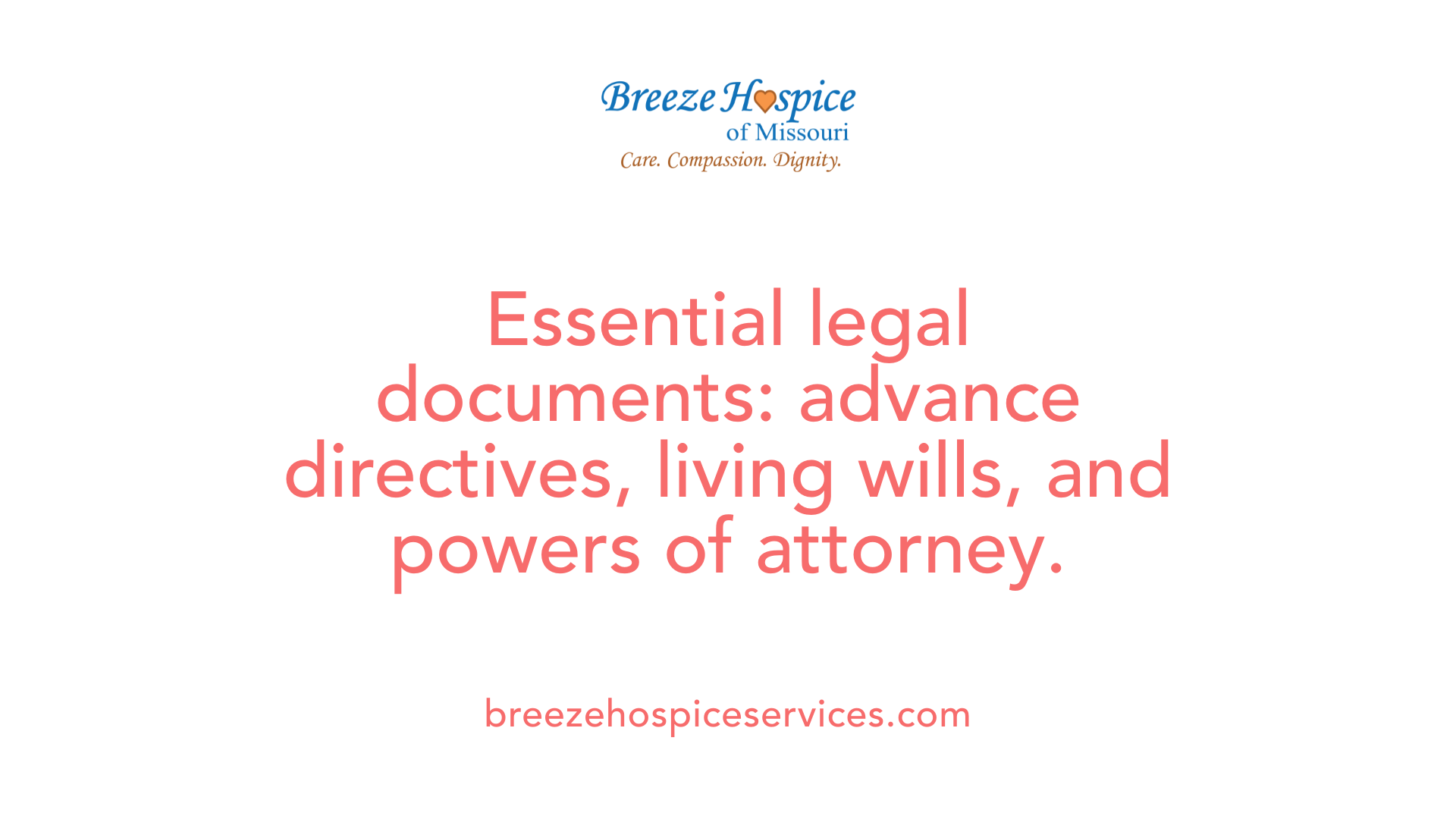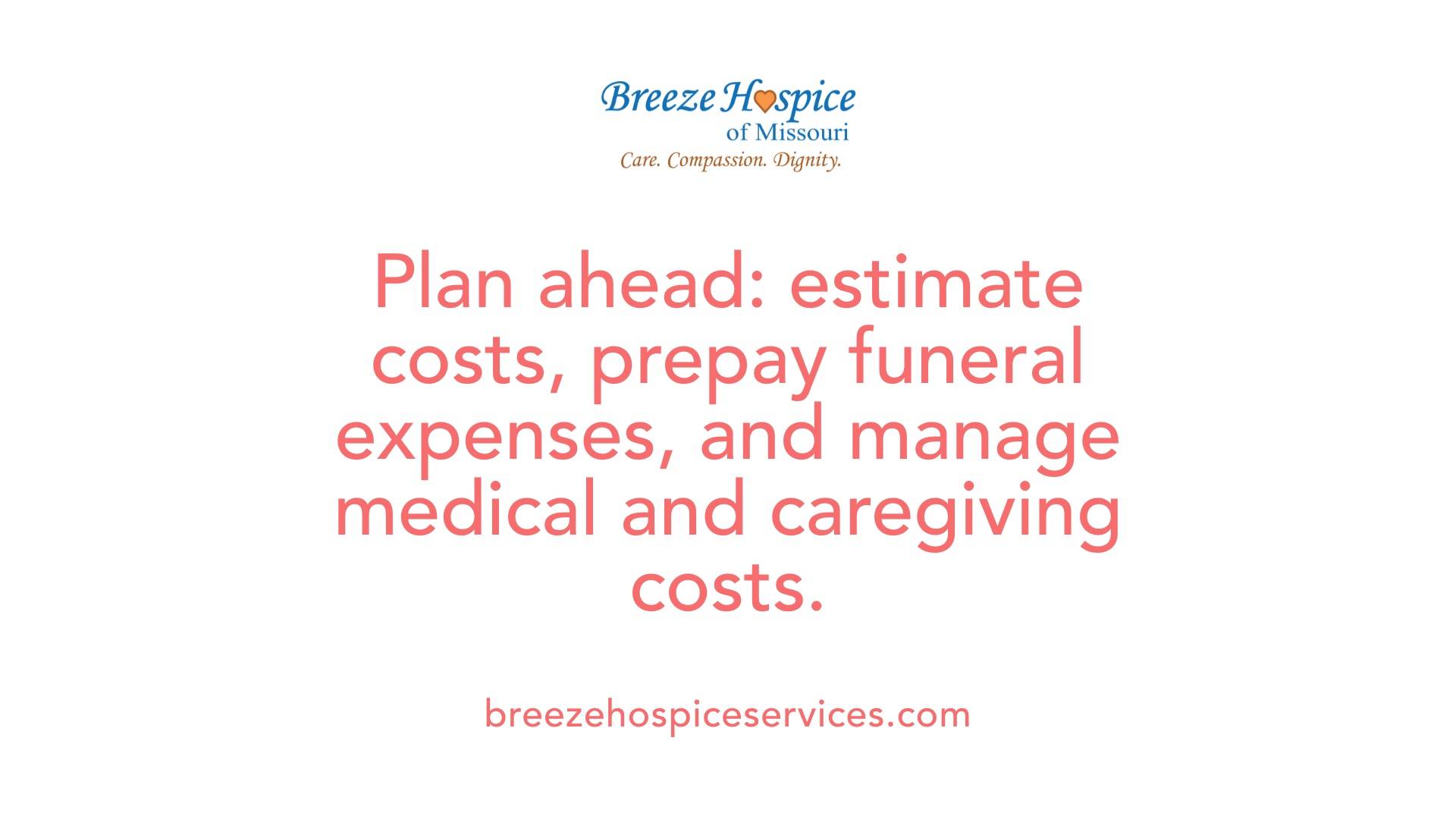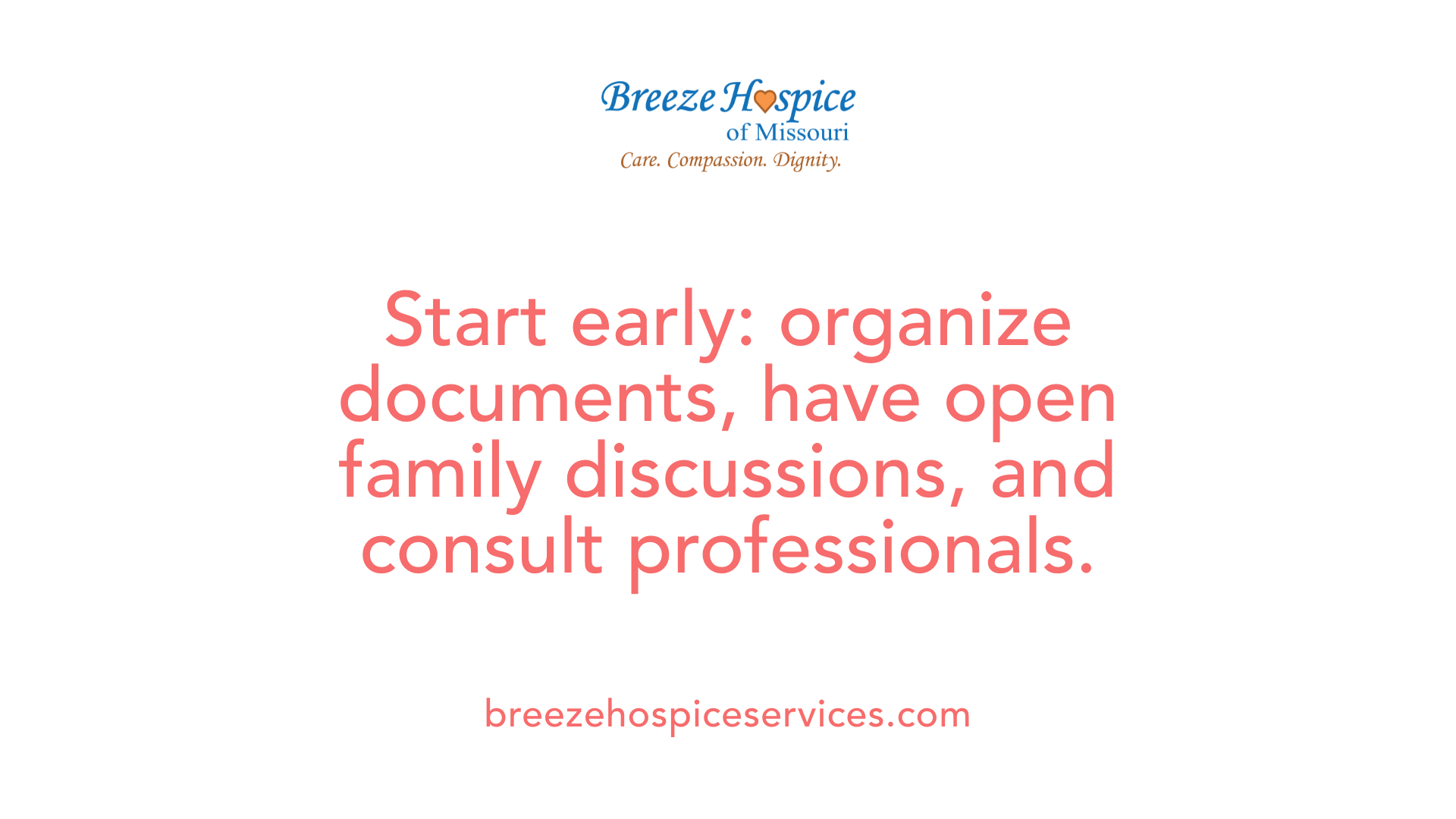Financial Planning for Hospice Care
July 21, 2025
Navigating End-of-Life Finances with Confidence

A Guide to Financial Preparedness in Hospice Care
Planning for hospice care involves crucial financial, legal, and emotional decisions. Understanding your options and preparing ahead can ease burdens on families, ensuring that a loved one's final wishes are honored while maintaining financial stability. This comprehensive guide explores the essentials of financial planning for hospice, including legal documents, funding sources, cost management, and navigating the complexities of end-of-life expenses.
Understanding Hospice Care and Its Eligibility Criteria

What is hospice care?
Hospice care is a specialized form of support aimed at enhancing the quality of life for individuals with a terminal illness. It focuses on symptom management, pain relief, and emotional and spiritual support rather than attempting to cure the disease.
Typically delivered in the patient's home, hospice care involves a team of healthcare professionals, including physicians, nurses, social workers, and spiritual advisors. Services also encompass medications for symptom control, physical therapy, counseling, and grief support for families.
What is the six-month rule for hospice care?
The six-month rule is a critical eligibility criterion for hospice services. It requires that a physician must estimate that the patient's prognosis is six months or less if the illness follows its current course.
This prognosis is based on the healthcare provider’s clinical judgment, disease progression, and overall health status. If the patient survives beyond six months, their eligibility can be reassessed, and care can continue if the patient still qualifies.
Hospice care is flexible; it can be adjusted according to the patient's ongoing health status. If a patient's condition improves, hospice services can be stopped. However, if their health declines again, they may requalify for hospice care.
The role of physicians in prognostic assessments
Physicians play a vital role in determining eligibility by assessing the patient’s prognosis. They consider medical history, disease trajectory, and current health to estimate the likely duration of life.
These assessments are essential for ensuring that hospice services are provided appropriately and ethically, respecting the patient’s wishes and medical needs.
| Aspect | Details | Additional Notes |
|---|---|---|
| Primary Criterion | Prognosis of 6 months or less | Must be certified by a physician |
| Reassessment | Possible if the patient's condition changes | Care can be extended or discontinued |
| Role of Physician | Prognostic evaluation | Based on clinical judgment and disease progression |
Understanding these criteria helps families and patients prepare for end-of-life care and ensures they receive appropriate, compassionate support during this challenging time.
Legal and Medical Documents for End-of-Life Planning

What are the three C's of hospice care?
The three C's—Compassion, Comfort, and Communication—serve as guiding principles in hospice care. Compassion emphasizes empathetic support for patients and families during difficult times. Comfort focuses on managing pain and alleviating distressing symptoms to improve quality of life. Communication ensures that everyone involved—patients, families, and caregivers—is well-informed and decisions are made collaboratively, respecting the patient's wishes.
What legal documents are essential when entering hospice care?
When a person enters hospice, several legal documents become vital to ensure their wishes are followed and legal obligations are met. These include advance directives, a living will, and durable power of attorney for healthcare and finances.
An advance directive provides instructions for medical care if the patient becomes unable to communicate. A living will specifies preferences about treatments like resuscitation or mechanical ventilation. The durable power of attorney appoints a trusted individual to make healthcare decisions or manage finances on the patient’s behalf.
Having these documents in place helps streamline decision-making, reduces confusion, and ensures the patient's choices are honored throughout their end-of-life journey.
How to keep and communicate legal wishes
To effectively manage end-of-life plans, it is crucial to keep legal documents in a safe, accessible location and inform trusted individuals of their whereabouts. Regularly reviewing and updating these documents—especially after major life changes—ensures they reflect current wishes.
Families should discuss the contents of these documents openly, clarifying any questions and reinforcing understanding. Sharing copies with healthcare providers and family members helps ensure that everyone is aware of the patient's preferences. Using a designated healthcare proxy or power of attorney facilitates adherence to the patient’s wishes when the time comes.
Engaging with legal professionals, such as elder law attorneys or estate planners, can provide additional guidance on creating comprehensive legal documents that cover all necessary bases. This proactive approach offers peace of mind, knowing that end-of-life decisions are well-documented, legally sound, and respected.
Financial Assistance and Payment Options

What is the six-month rule for hospice care?
Medicare eligibility for hospice care hinges on a specific time frame. To qualify, a doctor must certify that the patient has a terminal illness with a life expectancy of six months or less. This six-month rule ensures that hospice services are provided to those nearing the end of life, focusing on comfort rather than curative treatment.
Medicare coverage for hospice care
Medicare Part A covers most hospice services if patients meet the eligibility criteria, including certification of a terminal illness with a prognosis of six months or less. Once enrolled, Medicare pays for comprehensive hospice care, including physician services, medications for symptom management, medical supplies, and grief counseling. Patients typically pay minimal copayments for outpatient drugs and a small percentage for inpatient respite care.
Medicaid and state-specific programs
Medicaid can also provide hospice coverage, though availability varies by state and depends on eligibility. In addition to federal Medicaid, some states have supplemental programs to assist with end-of-life costs. These programs help cover services not fully paid by Medicare or private insurance, offering additional support to low-income patients.
Private insurance and personal funds
Private health insurance plans may include hospice coverage, but policies differ widely. It’s important to review individual plans to understand what is covered. Many individuals also choose to pay out of pocket or use savings, life insurance benefits, or annuities to cover expenses not covered by government programs.
Veterans' benefits and other resources
Veterans and eligible spouses can access additional support through the Department of Veterans Affairs (VA). VA benefits often fully cover hospice services for qualifying veterans, without copayments. The VA also offers programs like TRICARE and CHAMPVA, which include hospice care, caregiver support, and legal or financial assistance. Nonprofit organizations and charities may also provide financial aid for medications, supplies, or facility costs.
Summing up payment options
Financial planning for hospice care involves understanding multiple sources of support—from Medicare and Medicaid to private insurance and veteran benefits. Pre-planning and reviewing existing coverage can ease financial burdens and ensure that care preferences are honored.
| Funding Source | Coverage Details | Additional Support | Cost Range |
|---|---|---|---|
| Medicare | Full coverage if terminal prognosis | Grief counseling, medications, supplies | Generally free, small copays for meds |
| Medicaid | Varies by state | Supplemental programs, low-income assistance | Varies, often partial coverage |
| Private Insurance | Varies by policy | May include additional services | Out-of-pocket or insurance-covered |
| Veterans' Benefits | Full coverage for eligible veterans | Caregiver support, legal advice | Usually free for qualifying veterans |
Planning ahead and understanding these options help families manage costs and focus on providing compassionate care.
Cost Management and Planning Strategies

Estimating costs of hospice and senior living
Planning for end-of-life expenses requires an understanding of the costs associated with hospice care and senior living options. Hospice services, covered primarily by Medicare and Medicaid, can vary in expense depending on the setting and services needed. In the U.S., funeral costs typically range from $7,000 to $10,000 for a comprehensive service, with cremation often being a more affordable alternative.
Senior living costs also fluctuate based on location, care level, and amenities. It is essential to review current financial circumstances, including savings, pensions, and government benefits, to develop an accurate budget for future expenses. Many families consider preplanning funeral and final expenses, which can include prepaid arrangements to lock in prices and lessen financial burdens.
Preplanning funeral expenses and arrangements
Preplanning funerals is a proactive approach that ensures a person's final wishes are honored while easing the emotional and financial strain on loved ones. This can involve setting aside funds through prepayment or purchasing life insurance policies such as final expense insurance.
It is also crucial to organize vital legal documents including wills, advance directives, and durable powers of attorney. Keeping these documents in a secure but accessible location and informing trusted individuals encourages smooth processing during an emotional time.
Managing medical debt and caregiving expenses
Medical debt often accumulates during serious illnesses or caregiving situations. To manage this, reviewing health insurance policies, including Medicare, Medicaid, and private insurance, is recommended. Medicare covers many hospice services but excludes treatments intended to cure terminal illnesses.
Caregiving costs include managing or paying for care in-home, assisted living, or nursing facilities. Understanding the payment levels of hospice care—routine home care, continuous home care, inpatient respite care, and general inpatient care—can help families navigate coverage options and avoid unexpected expenses.
An important guideline in Medicaid funding is the 80/20 rule, which stipulates that at least 80% of Medicaid payments for homemaker, home health aide, and personal care services should be spent directly on the workers providing these services. This rule emphasizes the importance of direct care quality and cost efficiency.
The importance of estate and investment planning
Estate planning and investment management form the backbone of secure financial management during end-of-life and beyond. Creating or updating wills, establishing trusts, and designating durable powers of attorney are fundamental steps. These legal tools ensure that assets are distributed according to wishes and that healthcare and financial decisions are made by trusted individuals.
Evaluating existing life insurance policies and exploring options such as accelerated death benefits can provide additional financial support during terminal illnesses. Diversifying investments and maintaining a balanced portfolio help preserve wealth over the long term.
Proper planning also includes reviewing and updating beneficiary designations to avoid legal disputes and ensure the intended distribution of assets. Engaging with financial advisors and elder law attorneys can ensure comprehensive and compliant estate management.
| Cost Aspect | Typical Range / Details | Additional Notes |
|---|---|---|
| Funeral Costs | $7,000 - $10,000 | Cremation is usually cheaper; pre planning helps lock prices |
| Hospice Care Payment Levels | RHC, CHC, IRC, GIC | Four care levels with specific coverage and fee schedules |
| Staffing and Direct Care | 80% Medicaid rule | Ensuring most funds go directly to caregivers |
| Legal & Estate Planning | Variable | Wills, trusts, power of attorney, advance directives |
Legal Responsibilities and Family Involvement
Family communication and decision-making
Effective communication is crucial when managing hospice care and end-of-life arrangements. Families should openly discuss patient wishes, preferences for care, and funeral plans. Regularly updating family members and involved parties helps ensure everyone understands their roles and responsibilities, reducing confusion during emotional times.
Managing estate and inheritance issues
Proper estate management includes reviewing and organizing legal documents like wills, trusts, and beneficiary designations. This preparation ensures that assets are distributed according to the patient's wishes. Creating a clear estate plan also helps avoid legal disputes and ensures that financial affairs are handled smoothly.
Designing guardians and executors
Choosing reliable guardians and executors is an integral part of legal planning. Guardians are responsible for minor children or dependents, while executors manage the estate after death. These individuals should be informed of their roles and provided with necessary documentation.
Updating legal documents periodically
Legal and financial situations can change over time. Regularly reviewing and updating documents such as durable powers of attorney, healthcare directives, and wills is essential to reflect current wishes and circumstances. This ongoing process helps prevent legal complications and ensures that the patient's preferences are respected.
Additional considerations
Consulting an elder law attorney or estate planner can provide valuable guidance on complex issues like Medicaid planning, trusts, and property management. Keeping important legal and financial documents accessible and in a secure location is vital for quick access when needed.
| Aspect | Important Steps | Additional Notes |
|---|---|---|
| Family communication | Discuss wishes openly | Maintain ongoing dialogue |
| Estate management | Review and organize documents | Consider legal advice |
| Guardianship & Executorship | Designate and inform | Provide legal authority |
| Legal updates | Review regularly | Adapt to life changes |
By actively managing these responsibilities, families can navigate hospice care with clarity and confidence, ensuring their loved ones' wishes are upheld and their legal affairs are in order.
Putting It All Together: Making a Holistic End-of-Life Plan

Why is early planning and open communication essential?
Starting discussions early with loved ones about preferences for hospice care, funeral arrangements, and legal documents helps ensure wishes are respected. These conversations reduce confusion and emotional stress during difficult times.
How should legal and financial documents be organized?
Gather important papers like wills, power of attorney, advance directives, and insurance policies. Store them in a safe, accessible place, and inform trusted family members about their whereabouts. Review and update these documents regularly, especially after major life changes.
Why is it important to review and update plans regularly?
Health conditions, laws, and family dynamics change over time. Periodic review ensures that your wishes remain current and all legal documents are valid.
How can professional advice enhance planning?
Consulting with elder law attorneys and financial advisors helps align your estate, legal, and financial plans. They can guide you through complex topics like trusts, Medicaid, and tax implications, ensuring comprehensive preparedness.
| Step | Action | Tips |
|---|---|---|
| 1 | Initiate discussions | Talk openly with family about wishes |
| 2 | Gather documents | Collect wills, powers of attorney, advance directives |
| 3 | Store documents securely | Use safes or digital backups |
| 4 | Schedule regular reviews | Annually or after major changes |
| 5 | Seek professional advice | Elder law attorneys and financial planners |
Careful planning and open dialogue are vital to honor your wishes and ease the burden on loved ones during end-of-life moments.
Ensuring Peace of Mind Through Thoughtful Planning
Proper financial planning for hospice care is vital to honoring loved ones' wishes, minimizing family stress, and safeguarding assets. From legal documents and insurance coverage to cost management and assistance programs, being proactive can make a significant difference. Engage with legal and financial experts, communicate openly with family members, and review plans periodically to adapt to changing circumstances. Through thorough preparation, families can navigate the complexities of end-of-life care with confidence and compassion.
References
- Preparing Your Finances For End-of-LIfe Care | RubyWell
- What Legal And Financial Steps Should Families Take For Hospice?
- How To Navigate Finances and Legal Tasks as a Hospice Caregiver
- Hospice Care & Estate Planning - What You Need to Know
- Navigating Financial Planning During a Terminal Illness Diagnosis
- Planning for home hospice care - Edelman Financial Engines
- Hospice Care Coverage - Medicare
- Financial Planning for Senior Living: Tips and Strategies



































































































